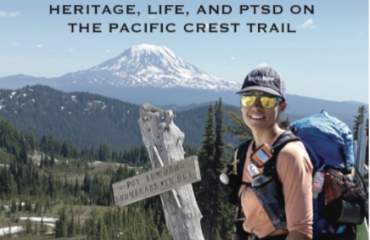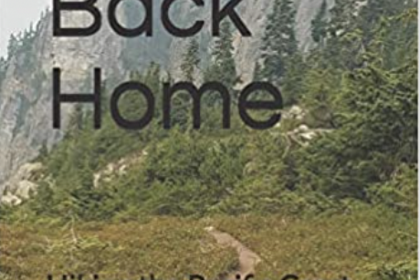
I know your time is precious. If you only have limited reading time, you don’t want to waste it on a mediocre book. So, if you are stuck in a reading rut and looking for your next great read, I recommend the first two books I have reviewed below. These two books may make my “best” of 2022 list.
These past two months, I dedicated myself to reading a genre I love–outdoor adventure. I also read two books that have not been released yet, so not all the books I read this month made it into this blog post, but stay tuned for a fall review of these first-time authors.
The following are my best and worst books for Spring 2022.
Walking Back Home: Hiking the Pacific Crest Trail by Rick Rogers
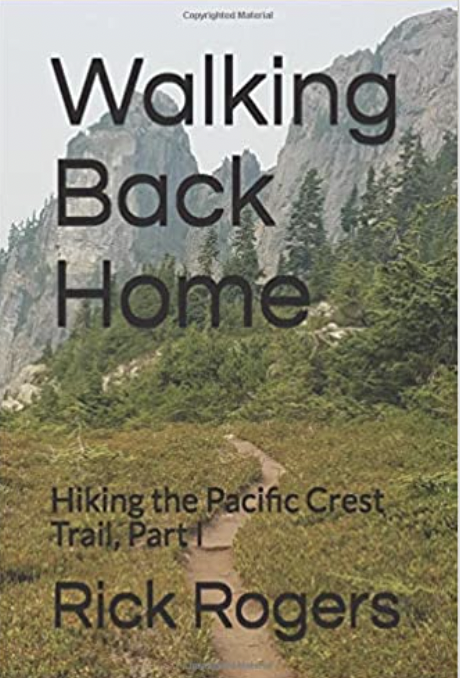
In Walking Back Home: Hiking the Pacific Crest Trail, Rick Rogers explores his adventure hiking the Pacific Crest Trail. The PCT is a trail stretching 2,650 miles from Mexico to Canada through California, Oregon, and Washington. With a healthy dose of humor, Rogers describes the trail’s practical aspects a hiker would want to know, such as how to use the bathroom and how Crater Lake formed, but he also reflects on the people he meets on the trail. Rogers observes how humans can be funny on the outside, but underneath the unshaven faces and dirty clothes of a thru-hiker, a story can be told about why each decides to tackle the trail.
Rogers uses humor to showcase the unique characters who choose to hike the PCT. He sets up a witty tone that lasts throughout the book. Rogers then reaches readers who may not want to hike the PCT trail by laying out the human-interest stories and the insights you gain after hiking over 2,000 miles. Capping these stories off are great descriptions of the landmarks along the PCT trail.
I absolutely adored Walking Back Home. I appreciated this book over other PCT trail books because Rogers isn’t hiking the PCT trail to find the meaning of life. However, he’s also an experienced hiker and outdoor enthusiast, so the reader doesn’t have to fumble through the main character’s simple mishaps like pitching a tent or packing a backpack to get to the meat of the story.
There is something for everyone in Walking Back Home. I enjoyed Rogers’s good-natured humor and laughed out loud several times. Rogers also doesn’t miss writing about the beauty of the trail and natural phenomena, and trail landmarks. But what stuck with me were the stories of the hikers he met along the way. Total strangers that end up close partners in just a few days. I especially enjoyed the story of one of his hiking partners, Robin. How does this happen, and what happens to these people after they hike on without each other?
This book hooked me from start to finish. This one is for you if you are interested in the PCT trail, love the outdoors, or like human-interest stories. My time spent with this book was a fulfilling time to reflect on the beautiful outdoors and what makes people different, unique, and intriguing.
I highly encourage you to buy the book at: https://www.amazon.com/Walking-Back-Home-Hiking-Pacific/dp/1795465964
Full Body Burden: Growing Up in the Nuclear Shadow of Rocky Flats by Kristen Iversen
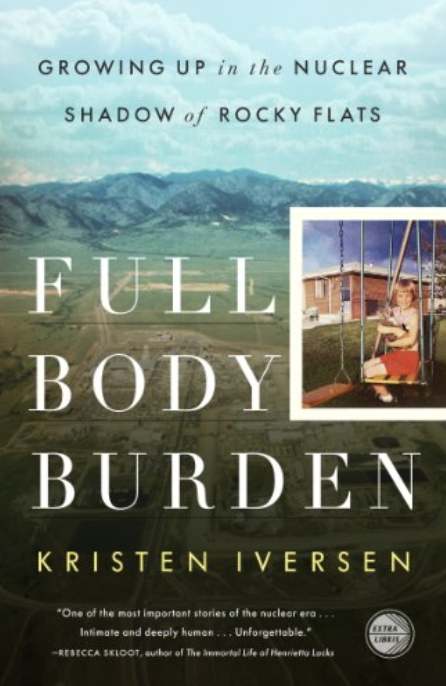
Kristen Iversen nails the art of narrative nonfiction in Full Body Burden: Growing Up in the Nuclear Shadow of Rocky Flats. The story weaves two storylines:
- Iversen growing up in an unstable environment, utterly unaware of the dangers lurking from the nuclear weapons plant nearby.
- The building, operation and end of the Rocky Flats nuclear weapons plant near Denver, Colorado.
It’s a story of a family and a government that knows how to keep secrets.
Iversen does a fantastic job taking her years of research to tell this haunting story. In the beginning, Iversen hits on something epic happening underneath Denver’s eye on Mother’s Day 1969. It was shocking to see how the government avoided catching the public’s eye while building and operating the plant. It also concealed and denied the wrongs they were committing to Denver’s people and environment.
Although I love nonfiction, there aren’t many of them I can sit through for multiple hours on end. However, I gobbled up Body Burden in a few days. I enjoyed Iversen’s writing style and point of view. I also enjoyed how she jumped from the absurd and scary secrets of Rocky Flats nuclear weapons plant to her unique upbringing down the road.
And in case you needed another reason to pick this book up, it’s also the winner of several awards: the Colorado Book Award & Reading the West Award, A 2012 Best Book by Kirkus Reviews and the American Library Association, Best Book about Justice by The Atlantic and a Finalist for the Barnes & Noble Discover Award and Andrew Carnegie Medal for Excellence.
I purchased this book from the Boulder Bookstore in Boulder, Colorado. This bookstore is great for browsing the local-author section, and I hit the jackpot here. Along with this book, I found signed copies from one of my favorite author’s books, several outdoor books, hard-to-find magazines and this book. I highly recommend visiting this store if you get the chance: https://www.boulderbookstore.net/
For more information about this book, please see the book’s website here: https://www.kristeniversen.com/book/full-body-burden
The Girl Who Smiled Beads by Clemantine Wamariya
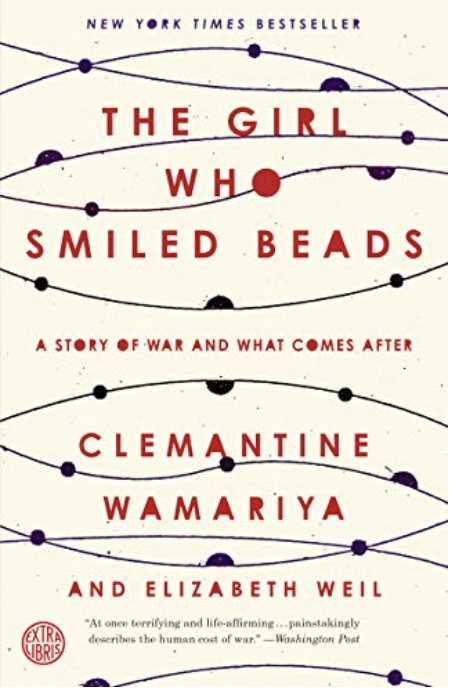
Clemantine grew up in Kigali, the Rwandan capital in a stable loving household with a family garden. However, once the Rwandan genocide began, where over 800,000 were murdered, Clemantine’s parents sent her at age six and her 16-year-old sister away. The sisters spend the next six years walking through seven African countries seeking safety. During this time, they did not know if their parents were alive. Clemantine and her sister were granted asylum in the United States. At age 12, Clemantine begins a new life in America, with a supportive family and opportunities to succeed.
Clemantine’s story is remarkable and unbelievable. The book gives a true ‘boots on the ground’ view of the conflict. I have not read a book about the Rwandan genocide and it was more than eye-opening to read this horrific, yet uplifting story. It should be part of our education in world history, and I am thankful I read the book.
This story cannot be duplicated in its brutal honesty and emotions. However, I felt that Clemantine has not found the peace she needs from her experiences and can’t positively move forward in a new, supported direction. Her vantage point is quite negative. I would assume this is the most authentic way anyone could go through an experience like this. However, if we want to progress and avoid future atrocities like this, we have to see others’ good intentions and desire to understand, learn and work for a brighter future. Throughout the book, Clemantine did not do this. She is emotional and doesn’t want to hear other people’s opinions or questions. Honestly, it was quite exhausting by the end to listen to such negative thoughts after she came out ok in the end.
The story and explanation of events at the beginning of the book hooked me, but towards the end, I almost abandoned it, just as Clemantine has abandoned hope for understanding.
If you want to jump straight into sobbing, check out the Oprah episode here:
Our Woman in Moscow by Beatriz Williams
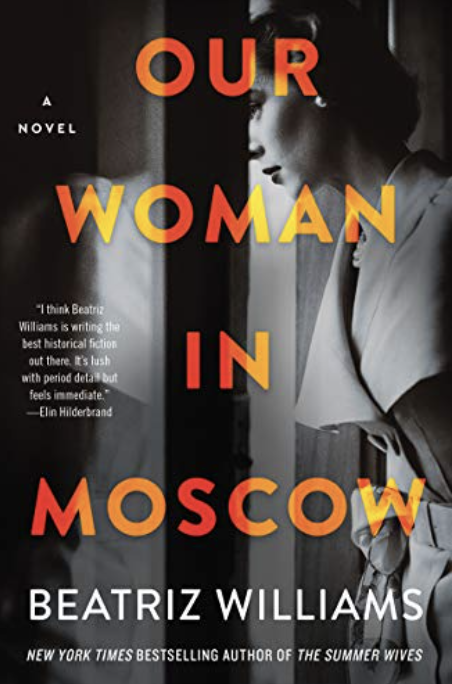
In 1952, Ruth is running a modeling agency in New York. Sumner Fox, an FBI agent, knocks on her office door to get information about her non-identical and estranged twin sister Iris. Iris disappeared with her husband Sasha and two children in 1948. After not speaking since 1940, Ruth receives a postcard from Iris asking for help. Ruth assumes an identity and travels to the Soviet Union to try to extract Iris and her family. The story weaves between two periods, slowly unraveling how both sisters ended up where they are and where they will go.
Our Woman in Moscow is loosely based on the Cambridge Five, a group of men who fed information to Russia from the United Kingdom for over 20 years. But Williams focuses the story on the women associated with the men and builds an intriguing espionage story.
Despite the two periods, I was able to easily follow the story. I enjoyed how Williams built the characters, including Ruth’s punchy style and twisting personalities inherent in counterespionage. The most surprising aspect for me was that this is a World War II book. I thought I was sick and tired of these stories. Turns out that if you can write captivating stories, it doesn’t matter the subject.
I have never read Williams’ work, but do love historical fiction, and this book didn’t disappoint. This story gives a reader everything you would want in a story—spies, lies, love, and adventure.
For more information on Beatriz Williams, you can visit her website at: https://beatrizwilliams.com/about/
So what have you been reading lately? If you have a great book to share, let me know.
I would also love to hear from authors who are looking for a book to read and review. Please contact me at https://rivetservice.com/contact-rivet-service/ if you are a first-time author looking for a review.




